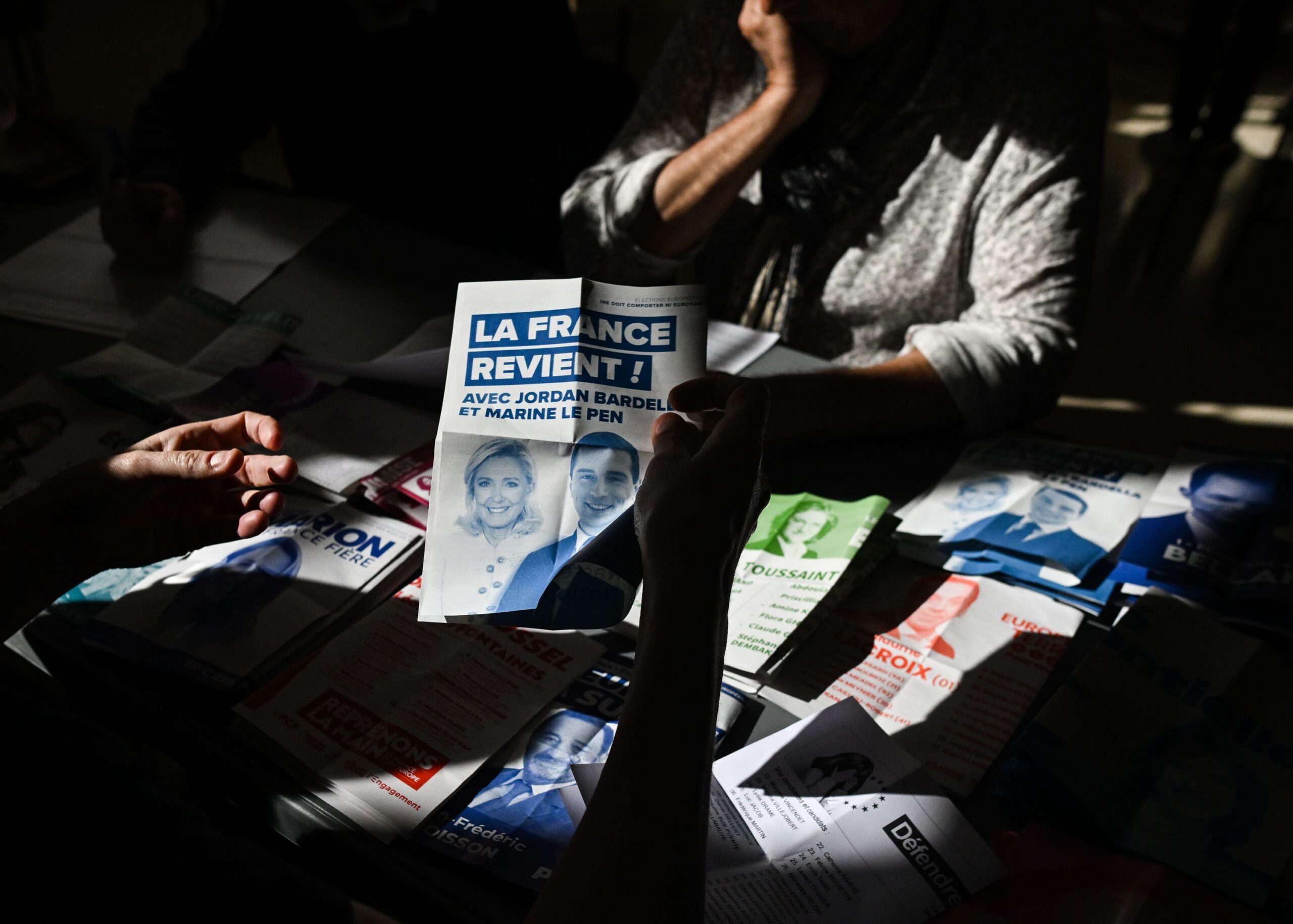Elections for the European Parliament are often a good bellwether for the ideological state of the union. In his Ideas Letter essay, Cas Mudde, the eminent scholar of the right, asks all the “right” questions about the democratic-versus-reactionary dynamic and whether scaremongering can ever be an effective posture.
Our other Ideas Letter essay this issue is from Lily Lynch, a gifted writer who has been publishing far and wide on a variety of themes. Lynch, who is presently based in Constantinople, looks at the irresistible rise of the CHP, the main opposition party, against Prime Minister Recep Tayyip Erdogan’s governing AKP and what this may mean for the future of Turkey’s foreign policy.
We lead our curated section with a close friend of The Ideas Letter, the indefatigable writer Evgeny Morozov, whose new 10-part podcast series A Sense of Rebellion provides an insider’s revisionist take on the founding of smart technologies. With music from Brian Eno, Morozov’s podcast is nothing short of an event in itself.
We then highlight a report from the Carnegie Endowment for International Peace on how Silicon Valley (un)worthies have trip-wired the development sector on the African continent. A story that needs telling and that is told, to boot, from an unlikely narrator.
Next up is another podcast, the second installment from Adrienne Buller’s new venture The Break Down, in which the fine academic Adam Hanieh discusses why moving away from fossil fuels is harder than you think (but no less imperative).
Premilla Nadasen then discusses in New Books Network why we should care that the care industry is so riddled with contradictions.
Our musical selection comes from the pianist Krzysztof Komeda, one of the greats of the Polish jazz scene, whose 1966 avant record Astigmatic was a major contribution when released. The Penguin Guide to Jazz, the bible for jazz aficionados, called it “one of the finest jazz albums ever made in Europe.”
—Leonard Benardo, senior vice president at the Open Society Foundations
Moving Beyond the “Democracy vs. Far Right” Division

Cas Mudde
The Ideas Letter
Essay
The traditional framing of elections as a binary choice between “democracy” and the “far right” is overly simplistic and does not accurately reflect the shifting dynamics of modern politics. Mainstream parties frequently succeed electorally by incorporating far-right rhetoric and policies, thereby diminishing the distinction between the political center and the far right.
“The question is not whether the center holds but whether liberal democracy holds. While the far right constitutes the most severe threat to liberal democracy today, not everything the far right does or says is anti-liberal democracy. More importantly, while mainstream parties are the primary defenders of liberal democracy, not everything they do is necessarily good for liberal democracy. Ultimately, liberal democracy cannot be saved with a purely defensive and ‘anti-populist’ agenda. Far-right support is grounded in protest, in disappointment over (perceived) failures of the political mainstream. These voters can only be won back if mainstream parties offer an alternative political program, grounded in their own ideology rather than in simply copying the issues and positions of the far right. Crucially, liberal democratic parties should inspire and empower citizens, rather than just scare them with the threat of ‘fascism’ or disempower them by telling them that ‘There Is No Alternative’ (TINA).”
From Crisis to Convergence
The Shifting Dynamics of Turkey’s Political Arena

Lily Lynch
The Ideas Letter
Essay
The Republican People’s Party (CHP) of Turkey has evolved from its hardline secularist roots, adapting its policies to appeal to religious conservatives and tempering its stance on foreign affairs to align more closely with the ruling Justice and Development Party (AKP). This convergence in domestic and foreign policy between the two parties reflects a broader nationalist sentiment in Turkey, challenging traditional pro-Western positions and emphasizing a more autonomous and assertive identity.
“The CHP’s evolution during the AKP’s more than two decades in power reveals that it is a party willing to adapt its foundational principles. It has shed its fervent secularism and embraced ideas once antithetical to it. The CHP’s laicism was an antidote to Ottomanism and nationalism, a means of escaping the trappings of Empire. But today, despite its recent electoral successes, the party has yet to articulate an attractive alternative message on foreign policy that would distinguish it from the AKP’s increasingly global ambitions. Strategic ambiguity might appeal to a pragmatic security establishment, but it also leaves the CHP in a weak position: Erdogan has politicized foreign policy to his benefit in the past, and with the Century of Türkiye only just beginning, he looks poised to continue in the years ahead.”
A Sense of Rebellion
Evgeny Morozov
Post-Utopia
Podcast
The countercultural scientists behind the Environmental Ecology Lab, a 1960s secretive, privately funded laboratory in Boston’s North End, rebelled against the regimented, monotonous, and soul-draining world of computing. The group’s founders envisioned computers and household gadgets that would be personal, responsive, and intimate. But their innovations remain largely ignored or have been forgotten, due to the group’s financing difficulties: They eschewed military connections and failed to attract corporate support.
“…Using technology to make us more complex, well-rounded individuals is an expensive endeavor—and tech corporations won’t foot the bill. They’d rather offer apps to solve immediate problems or encourage us to consume more of the same—movies, music, news—albeit better refined thanks to their vast data on us. If technology is going to help us spot unrecognized problems or develop new tastes and skills beyond our current data profiles, we will need a stronger public voice in its development.”
The Impact of a Californian Ideology in Africa
Curated Subtitle (or delete)
Andrea Pollio
Carnegie Endowment for International Peace
Article
Silicon Valley ideologies, particularly about lean startups and nudge theory, have significantly influenced development strategies in Africa. These ideologies, characterized by technological optimism and entrepreneurial empowerment, have shifted development and antipoverty practices in Africa toward market-driven, technology-based solutions, despite potential pitfalls and a history of overlooking local complexities and contexts.
“Ultimately, even when or if observers are critical of some of their assumptions, managerial and behavioral theories have also a life of their own, circulating and being transformed as they are applied and experimented. New relationships between places, new alliances, and shared grammars form out of these mobilities. In turn, I would argue, these connections offer a vehicle for thinking about the inextricable lattice of relations that already exist between geographies that seem to have little to do with each other. More importantly, such existing linkages are also an avenue for researchers, policy planners, consultants, activists, entrepreneurs, and other observers to reflect propositionally about the stakes and the possibilities of these connections.”
A World Made of Oil
Adam Hanieh
The Break Down
Interview
Hanieh delves into the historical and geopolitical aspects of oil and imperialism, examining how petrochemicals and plastics, which are now integral to our daily lives—critical to the production of the food we consume to the clothes we wear—make it increasingly challenging to oppose the dominance of the fossil-fuel industry.
“I don’t think there’s any way we can separate out fossil fuels and capitalism as a social system … The reason why oil in particular, but all fossil fuels, have kind of become incorporated into our lives in such a way that is completely invisible to us now is because of what they do for capitalism, what they do for the ability to expand markets limitlessly, the ability to speed up production to replace labor, all of these kinds of systemic logics are bound up with fossil fuels and the way that wealth from the industry has circulated and become so important to political and economic power over the 20th century is another reason why I think it’s almost impossible to see a non-fossil capitalism.”
Care
The Highest Stage of Capitalism
Premilla Nadasen
New Books Network
Podcast
Billions of dollars in relief aid were distributed during the COVID-19 pandemic—yet the funding did not make a meaningful difference for many who endured hardship in this period, writes Nadasen. The discrepancy between the aid and its impact underscores a fundamental flaw in the contemporary care economy, which includes federal and state programs, healthcare facilities, and NGOs that often try to align the needs of those they serve with the incentives and mechanisms of capitalism. As a result, this extensive system frequently falls short, leaving workers and those requiring assistance in unstable and often hazardous conditions. Nadasen also discusses offramps, or forms of resistance that workers and activists have adopted to develop alternative anticapitalist forms of care that might someday allow all of us to truly flourish together.
“For me radical care … is fundamentally different from what we’ve seen emerging in the care economy, because it is non-hierarchical, it is anti-capitalist, collective, and outside the profit making economy. And so the models of radical care you’re talking about with the Black Panther Party, but there are many other examples as well, so the mutual aid efforts that happened during the pandemic, these were simply initiatives that people picked up in their own communities to help other people out who were in need. It is a form of care that has emerged sometimes strategically, sometimes organically, by people who have been abandoned by the state and have had to find ways to survive and cope, and through that struggle they have developed new models of being and living.”
